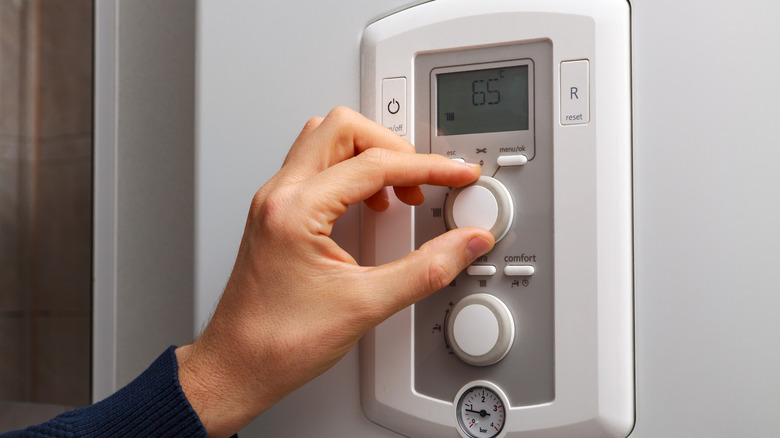What Is The Ideal Temperature To Keep Your Bedroom At?
While everyone has their own preferred "ideal" sleeping temperature, there is actually one that is recognized as being the most conducive to a good night's sleep. According to science, the ideal sleeping temperature is about 65 degrees Fahrenheit – though most experts agree that anything from 60 to 68 degrees Fahrenheit is fine for promoting restful slumber. This recommendation applies in both the winter and the summer. Keep in mind that you can always add or remove layers of clothing and blankets as needed to suit your level of comfort or lower the thermostat at night.
Though temperatures that are much colder than this can also have negative impacts on your overall sleep quality by keeping you up, sleeping in anything warmer than the recommended temperature range is actually much worse for your sleep health. A warm environment counteracts your body's natural cooling process that takes place as you begin to feel sleepy before bed — the same one that helps you fall asleep and stay asleep through the night. "If someone told me that they slept in a temperature between 70 to 75, I'd say that's a range that promotes insomnia," says Alon Avidan, MD, MPH, director of the Sleep Disorders Center at UCLA (per WebMD). "That's toasty."
Keeping your bedroom in the recommended range of 60 to 68 degrees Farenheit while you sleep, adjusting the thermostat before bed if necessary, is one of the best ways to support your body's natural circadian rhythm and guarantee you get some high-quality shut-eye.
How temperature affects sleep
If your bedroom is too warm, you will likely notice that you have a difficult time falling and staying asleep. Your body's circadian rhythm that dictates the kind of "internal clock" your sleep schedule operates under causes your body's core temperature to cool down about two degrees before you fall asleep and stay cool until you wake up. This cooling begins roughly two hours before your body begins to feel tired and ready for bed, and continues through the night in order to help you fall asleep and stay asleep until morning. As your body's core temperature cools, it produces melatonin, your body's natural sleep hormone. Keeping your bedroom at around 65 degrees Fahrenheit can help aid in this natural cooling process and help you stay asleep through the night, while keeping it at anything much warmer runs you the risk of waking up a lot throughout the night and not feeling well-rested.
A study found that a warmed core body temperature, which can easily take place in a warmed sleeping environment, can decrease the amount of time you spend in the slow-wave sleep cycle, which helps your body feel restored and well-rested. The slow-wave sleep cycle also aids in immune system support and several other important bodily systems. A study also found that excessively warm temps in your sleeping environment can shorten the amount of time you spend in the REM stage of the sleep cycle, which is critical for basic cognitive functions like learning and memory.

